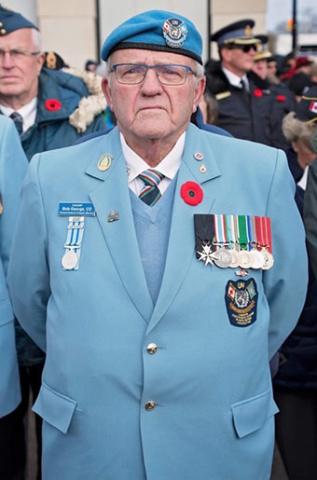
Joined
1957
Postings
- Gagetown, New Brunswick
- Petawawa, Ontario
- Shilo, Manitoba
- Carp, Ontario
- Kingston, Ontario
- Borden, Ontario
- Winnipeg, Manitoba
Deployments
- 1960-61, 1965-66 Gaza (UNEF I)
- 1963 Congo
Why were you sent to Egypt? What did you know about the mission?
The summer of 1959 found me stationed to 3 Signals Squadron in Camp Gagetown, New Brunswick – a 19-year-old, fresh out of basic and trades training (driver, mechanical transport). I received my orders for the United Nations Emergency Force (UNEF) deployment in the Gaza Strip. It was simply an individual replacement. There was no other rationale. I knew nothing about the mission and no information was provided prior to departure. It was on-the-job learning. September I was airborne on a noisy, slow, North Star aircraft with stops in Gander, The Azores, Gibraltar, Pisa and finally El Arish, Egypt, near the Gaza Strip border. I took ground transport from there to Rafah, where I would stay for most of my tour.
Describe your role during your time serving as part of the UNEF. Any memorable moments?
I stayed in Sharm-el-Sheikh for one month in December of 1960. Talk about a desolate area! It hadn’t rained in over twenty years; the heat could be unbearable (no air conditioning) and we only had power during the day time. I oversaw the PE 95 generator responsible for electrical power, which was required for regular communication (radio and teletype) with our home station in Gaza City. Situation reports were a daily requirement.
We maintained contact with Gaza HQ by radio and with the weekly incoming aircraft from El Arish. This was our only means of supply and rotation of personnel. There was also a small group of Canadian Contingent Engineers who maintained the buildings - such as they were - and operated a water desalination plant for drinking water.
This was the biggest experience of my young life. There were no people or roads in the area. The water and the beaches were untouched. There were millions of shells to find. There was one Bedouin family of three, and a few goats, that passed by one day. Heaven knows what they lived on. There wasn’t a blade of grass to be found.
The United Nations Guard Company was from the Swedish Battalion, and they were a super group. We were able to learn about people from another country and some of their customs. There was a small detachment north of Sharm, where a group of the Swedes recorded and reported shipping that passed by that narrow spot close to Saudi Arabia. On the way there, there was a well that Moses was supposed to have drunk from on his voyage from Mount Victoria, where he received the Ten Commandments. I didn’t drink from it.
It sounds so desolate – which it was – but it was so fascinating to a young kid, to be able to explore an area once touched by war in 1948 but virtually untouched since then. There were graveyards, mine fields and no maps. We had to be careful where we went.
I was sorry to leave there, not knowing that exactly five years later, I would return to basically the same place I had left. No improvements, no additions, same generator for me to maintain. It was still an equally exciting place to visit again.

The well Moses reportedly drank from. Saudi Arabia in the background.
What was the biggest challenge that you faced while on duty?
The biggest challenge was the different lifestyle from back home. Luckily, my young age was adaptable to almost anything.
How did you overcome this challenge?
Keeping busy was awkward at times, as we had no modern conveniences. There was good beer to drink and a sandy Mediterranean beach to swim in.
There were good friendships made but since we were from all over Canada, it was usually a short term friendship.
Lastly, what would you like Canadians to know about you, and your experiences as a Canadian Peacekeeper?
I didn’t realize at the time the importance the United Nations plays in the world. I do now. I just wish they could do more now to solve the problems of the world.

Sharm airport, 1960. Look for the windsock and land accordingly.
With courage, integrity and loyalty, Bob George has left his mark. He is one of our Canadian Veterans. Discover more stories.